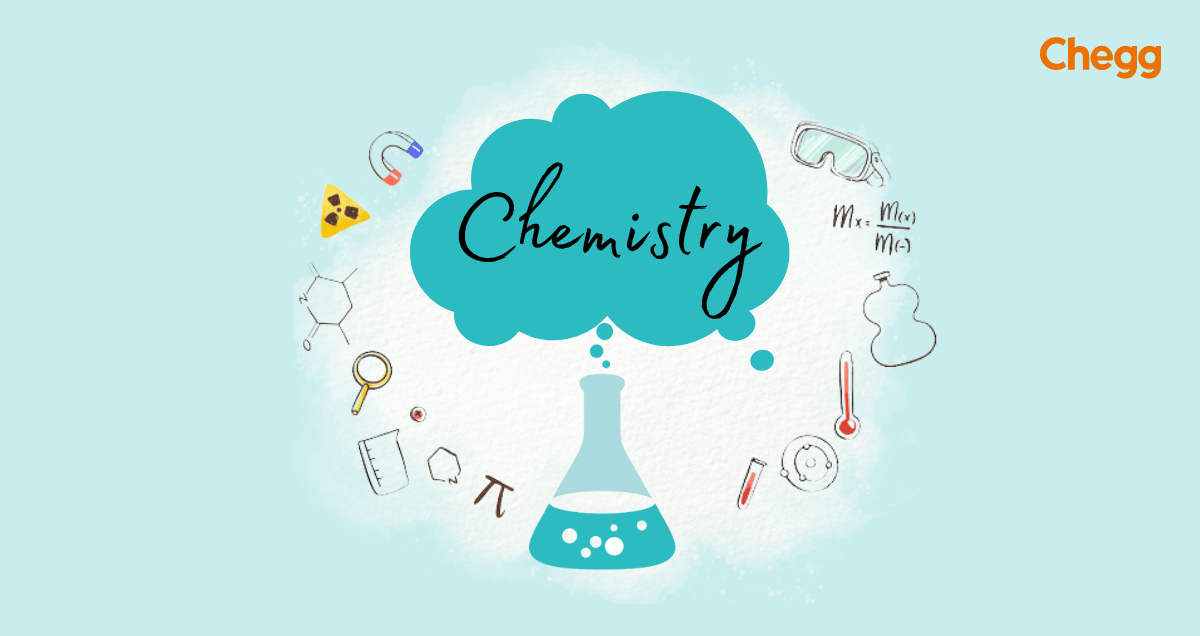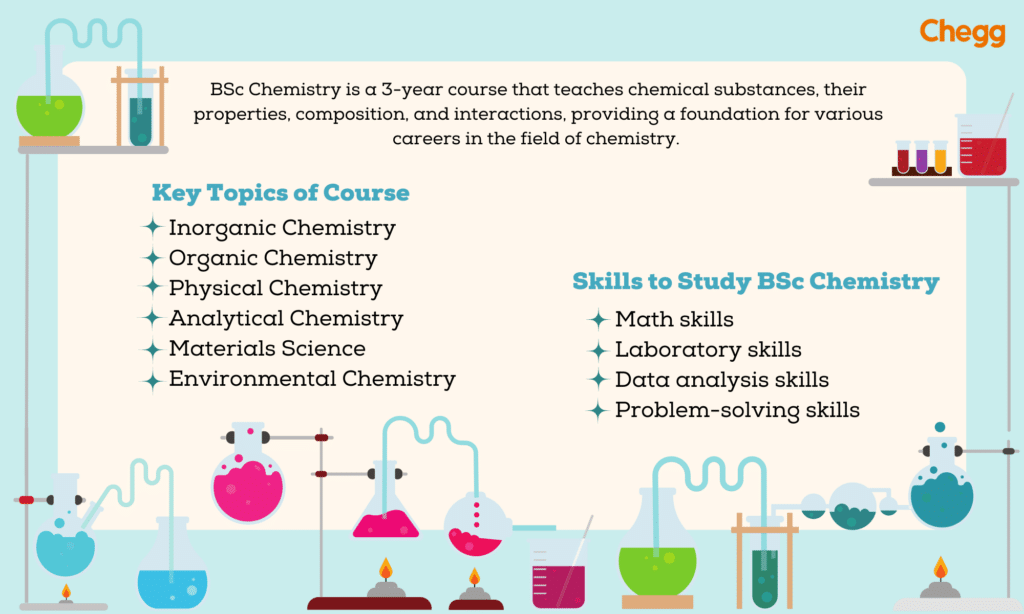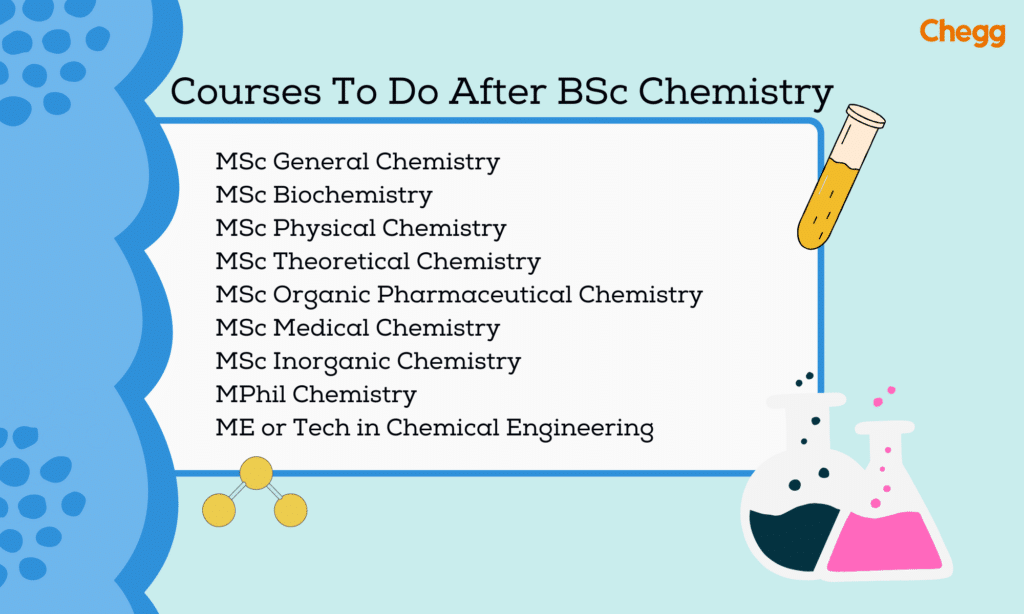
Table of Contents
“Chemistry is a Mystery of Chemicals, Chemists are the Detectives who solve this Mystery.”- Maanyaa Jain
Did the reaction of Sodium to air seem like a mystery to you, or did the existence of liquid metal make you question the general rule of metals? And do you want to uncover all these chemical mysteries?
Then dear reader, BSc Chemistry is the course for you. With subjects like Electrochemistry, Novel Inorganic Solids, Polymer Chemistry and a CAGR growth rate of 9.3% you will be able to learn well and earn better with various BSc Chemistry scope. So, keep reading till the end to know everything about the course.
What is BSc Chemistry?
- BSc Chemistry stands for Bachelor of Science in Chemistry.
- It is a 3-year undergraduate course in chemistry.
- The BSc Chemistry course teaches students about subjects like chemistry, physics, mathematics, and biology.
- The course also involves different branches of chemistry such as inorganic chemistry, organic chemistry, physical chemistry, and analytical chemistry.

BSc Chemistry Eligibility & Entrance Exams
Eligibility Criteria
- The student must have completed 10+2 education from the science stream.
- They must qualify for their Class 12th Board exams with 50%–55% aggregate marks.
- Some colleges also require students to clear entrance exams for admission.
Entrance Exams
- NPAT (Nariman Point aptitude test)- This is the entrance exam conducted by the Narsee Monjee Institute of Management Studies (NMIMS) for admission to the BSc Chemistry course. The exam follows the MCQ format for test and it is a computer-based exam.
- CUET (Common University Entrance Test)- Introduced just a few years ago CUET test is a national-level entrance exam conducted by the National Testing Agency (NTA) for admission to undergraduate (UG) courses like BSc Chemistry.
- SET (State Eligibility Test)- SET exams are state-level entrance exams conducted by different state universities/colleges for admission to other courses.
- CUCET (Chandigarh University Common Entrance Test)- This entrance exam is conducted by Chandigarh University for admission to its undergraduate courses in courses like BSc Chemistry.
- BHU UET (Banaras Hindu University Undergraduate Entrance Test)- It is an entrance exam conducted by Banaras Hindu University (BHU) for admission to undergraduate courses offered by the university.
Recommended Read: Best Career Options After 12th PCM
BSc Chemistry Syllabus & Subjects
| 1st-Year Syllabus | |
| 1st Semester |
2nd Semester |
|
|
| 2nd-Year Syllabus | |
|
3rd Semester |
4th Semester |
|
|
| 3rd-Year Syllabus | |
|
5th Semester |
6th Semester |
|
|

BSc Chemistry- Top 10 Colleges in India
| Colleges |
Fees |
|
Hindu College, Delhi. |
INR 61,380 |
|
ST. XAVIER’S COLLEGE, MUMBAI. |
INR 20,507 |
|
Deen Dayal Upadhyay College, Delhi. |
INR 58,035 |
|
Mount Carmel College, Bangalore. |
INR 1.26 lakh |
|
Sacred Heart College, Ernakulam. |
INR 20,910 |
|
Loyola College, Chennai University |
INR 50,000 |
|
Chandigarh University |
INR 1 lakh |
|
Madras Christian College, Chennai University |
INR 60,000 |
|
Jain University, Bangalore |
INR 75,000 |
|
Delhi Technological University (DTU) |
INR 20,000 |
Worthwhile Reads:
Courses and Career Options After B.Sc. Chemistry
Courses and Career Scope After MSc Chemistry
Top 10 After BSc Chemistry Jobs in India
1. Chemical Engineer
Becoming Chemical Engineer is a good choice for BSc Chemistry jobs, in this job chemical engineers need to apply their knowledge of chemical processes and principles to design, develop, and optimise production processes, ensuring efficiency, safety, and environmental compliance. They also need to analyse data, conduct experiments, and troubleshoot to improve product quality and reduce costs.
Related Read:
Trending Chemical Engineering Jobs in India
Career in Chemical Engineering
2. Lab Chemist
Lab Chemists examine the reactions of different chemicals and develop drugs, cosmetics, and other daily-use products. They also improve the quality of products and methods by developing new products. For this, they often collaborate with research teams and contribute to scientific advancements, while adhering to safety protocols to ensure a productive and efficient laboratory environment. This job role provides great after BSc Chemistry scope to learn and grow in a scientific career.
3. Biomedical Chemist
The primary role of a Biomedical Chemist is to work in basic and applied research for planning and conducting projects. These professionals work as research scientists, clinical research assistants, laboratory administrators, etc. With a strong foundation made during the BSc Chemistry course, they apply their knowledge to solve complex biological problems, optimise drug formulations, and ensure the safety and effectiveness of medical products.
4. Quality Controller
These professionals are chemists who are specifically trained during the BSc Chemistry course to measure, evaluate and check the quality standards in a laboratory. They ensure compliance with all applicable federal standards and regulations and adherence to internal quality guidelines and protocols. Their expertise in chemistry enables them to identify and resolve issues related to product quality, ensuring the delivery of safe and effective products to consumers.
5. Product Manager
A Product Manager has to build products from existing ideas and help develop new ideas based on industry experience and contact with customers. Their role is to guide R&D, Manufacturing, Marketing, and Sales teams responsible for chemical product line manufacturing. They must also conduct market research, analyse customer needs, collaborate with cross-functional teams, and ensure product quality and regulatory compliance.
6. Chemistry Lab Technician
Chemistry Lab Technicians are responsible for a wide variety of tasks as they help chemists in the lab. They work in laboratories or facilities and are consistently in contact with various chemicals. Thein knowledge of BSc Chemistry helps them contribute to the advancement of scientific knowledge and aid in the development of new products and processes.
7. Medical Technologist
A Medical Technologist is responsible for performing laboratory work. This includes conducting tests on patient specimens to diagnose diseases. The job profile requires immense responsibility as accurate reports should be generated. Their expertise gained from BSc Chemistry course knowledge, enables them to handle advanced instrumentation and techniques, ensuring accurate and reliable results. Medical Technologists also contribute to research and development, quality control, and laboratory management.
8. Research & Development Manager
R&D Managers research planning and implementing new programs in the company. They also supervise the implementation of new products and programs. Their role involves analysing data, conducting experiments, managing budgets, and ensuring working with regulations. They play a crucial role in driving innovation and contributing to the advancement of scientific knowledge in the field of chemistry.
9. Subject Matter Expert (Chemistry)
After completing the BSc Chemistry course one can become Subject Matter Expert and use their knowledge to teach and earn. The role of a subject matter expert is to provide guidance and assistance to students in achieving their career goals.
If you want to become a Subject Matter Expert, then there is no better platform than Chegg India. As Chegg’s Q/A Expert, you will be responsible for solving students’ queries related to Chemistry. The best part about this job is that you can work from anywhere and at any time.
10. Forensic Scientist
A Forensic Scientist with a BSc in Chemistry is a job that requires scientific knowledge and techniques to analyse physical evidence collected from crime scenes. These scientists use their expertise to identify and evaluate various substances, such as drugs, chemicals, or biological samples. Forensic Scientists play a crucial role in criminal investigations, helping to uncover evidence and contribute to the justice system.
Also Read These:
Career Scope After BSc Forensic Science in India
A Complete Guide to Pursue Career in BSc Radiology
Best MSc Colleges in India to Pursue Master’s Degree
BSc Chemistry Jobs- Skills & Salaries
| Job Roles | Skills Required | Average Salary (in INR) |
|
Chemical Engineer |
|
3.1 LPA |
|
Lab Chemist |
|
2.2 LPA |
|
Biomedical Chemist |
|
6.0 LPA |
|
Quality Controller |
|
2.0 LPA |
|
Product Manager |
|
17.0 LPA |
|
Chemistry Lab Technician |
|
2.1 LPA |
|
Medical Technologist |
|
2.5 LPA |
|
Research & Development Manager |
|
14.0 LPA |
|
Subject Matter Expert (Chemistry) |
|
3.2 LPA |
|
Forensic Scientist |
|
4.8 LPA |
Salary Source: Ambition Box, PayScale
Top Recruiters of BSc Chemistry Graduates
- TATA Chemicals
- DIVI’S Laboratories
- Lupin
- Birla Group
- Ajanta Pharma
- Marico
- SCIEX
- Vinatic Organics
- Ipca Laboratories
- Fineotex Speciality
Explore About More BSc Branches:
Most In-Demand BSc Courses and High-Paying Jobs
BSc Nautical Science: Scope and Career Path
Best Career Options and Jobs after B.Sc. Biology
BSc Physics-Course Details and Scope in India

Key Takeaways
BSc in Chemistry is a course for people who want to make a change in a scientific field with the help of chemicals and reactions. And if this interests you then you should positively choose this course. With job roles like Forensic Scientist, Quality Controller, Subject Matter Expert, Project Management etc you will always be learning and making progress in your career.
And for more such interesting & informative articles on courses and career tips visit our Career Advice section right away!
Frequently Asked Questions
What is BSc in Chemistry?
BSc in Chemistry stands for Bachelor of Science in Chemistry. It is a 3-year undergraduate course, it provides foundational knowledge of the multiple elements and aspects of Chemistry. The BSc Chemistry course is one of the most sought-after courses in India.
Is BSc Chemistry a good career?
Yes, a career after BSc in Chemistry is good, as it provides great scope to the candidates. One can choose to do the job in private as well as government sector. There are a variety of job positions in which a BSc Chemistry candidate is required.
What is the job scope for BSc Chemistry?
BSc Chemistry scope offers a wide variety of job roles to the candidates, you just need to choose the job which interests you and matches your career goals. Some of the best BSc Chemistry job roles are:
1. Product Manager
2. Research & Development Manager
3. Biomedical Chemist
4. Forensic Scientist
5. Subject Matter Expert (Chemistry)
Is BSc Chemistry easy?
BSc Chemistry is one of the best undergraduate courses. However, some of its topics require additional effort as compared to other subjects. Topics such as Organic Chemistry may be challenging for some. And it would be better if you had a background in maths.
To read more related articles, click here.
Got a question on this topic?